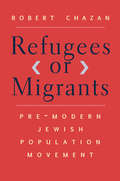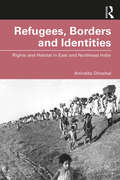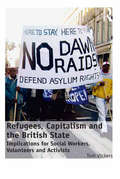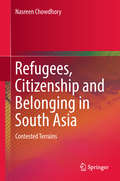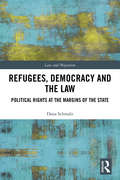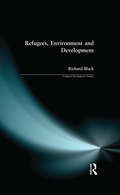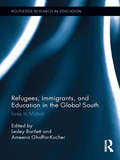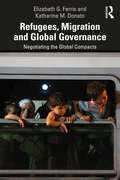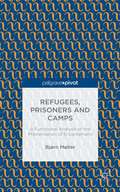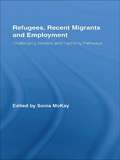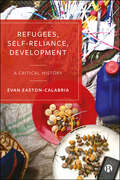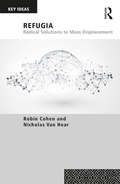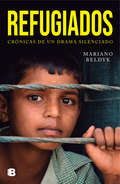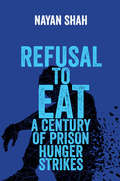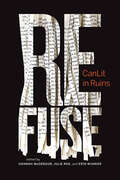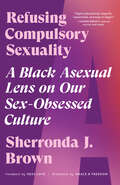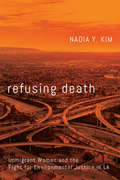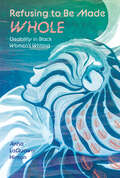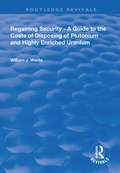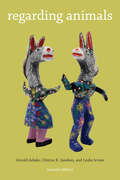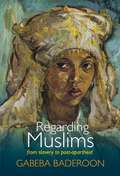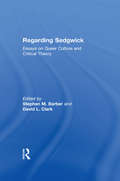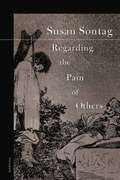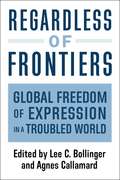- Table View
- List View
Refugees or Migrants: Pre-Modern Jewish Population Movement
by Robert ChazanA leading historian argues that historically Jews were more often voluntary migrants than involuntary refugees For millennia, Jews and non-Jews alike have viewed forced population movement as a core aspect of the Jewish experience. This involuntary Jewish wandering has been explained by pre-modern Jews and Christians as divine punishment, by some modern non-Jews as the result of Jewish harmfulness, by some modern Jews as fostered by Christian anti-Jewish imagery, and by other modern Jews as caused by misguided Jewish acceptance of minority status. In this absorbing book, Robert Chazan explores these various perspectives and argues that pre-modern Jewish population movement was in most cases voluntary, the result of a sense among Jews that there were alternatives available for making a better life elsewhere.
Refugees, Borders and Identities: Rights and Habitat in East and Northeast India
by Anindita GhoshalThis book examines the impact of Partition on refugees in East and Northeast India and their struggle for identity, space and political rights. In the wake of the legalisation of the Citizenship Amendment Act in 2019, this region remains a hotbed of identity and refugee politics. Drawing on extensive research and in-depth fieldwork, this book discusses themes of displacement, rehabilitation, discrimination and politicisation of refugees that preceded and followed the Partition of India in 1947. It portrays the crises experienced by refugees in recreating the socio-cultural milieu of the lost motherland and the consequent loss of their linguistic, cultural, economic and ethnic identities. The author also studies how the presence of the refugees shaped the conduct of politics in West Bengal, Assam and Tripura in the decades following Partition. Refugees, Borders and Identities will be indispensable for scholars and researchers of refugee studies, border studies, South Asian history, migration studies, Partition studies, sociology, anthropology, political studies, international relations and refugee studies, and for general readers of modern Indian history.
Refugees, Capitalism and the British State: Implications for Social Workers, Volunteers and Activists
by Tom VickersToday, in a period of economic crisis, public sector cuts and escalating class struggle, Marxism offers important tools for social workers and service users to understand the structures of oppression they face and devise effective means of resistance. This book uses Marxism's lost insights and reinterprets them in the current context by focussing on one particular section of the international working class - refugees and asylum seekers in Britain. Vickers' analysis demonstrates the general utility of a Marxist approach, enabling an exploration of the interplay between state policies, how these are experienced by their subjects, and how conflicts are mediated. The substantive focus of the book is twofold: to analyse the material basis of the oppression of refugees in Britain by the British state; and to examine the means by which the British state has 'managed' this oppression through the cultivation of a 'refugee relations industry', within a broader narrative of 'social capital building'. These questions demand answers if social workers and other practitioners are to successfully work with refugees and asylum seekers, and this book provides these through a detailed Marxist analysis.
Refugees, Citizenship and Belonging in South Asia: Contested Terrains
by Nasreen ChowdhoryThis book examines forced migration of two refugees groups in South Asia. The author discusses the claims of “belonging” of refugees, and asserts that in practice “belonging” can extend beyond the state-centric understanding of membership in South Asian states. She addresses two sets of interrelated questions: what factors determine whether refugees are relocated to their home countries in South Asia, and why do some repatriated groups re-integrate more successfully than others in “post-peace” South Asian states? This book answers these questions through a study of refugees from Sri Lanka and Bangladesh who sought asylum in India and were later relocated to their countries of origin. Since postcolonial societies have a typical kind of state-formation, in South Asia’s case this has profoundly shaped questions of belonging and membership. The debate tends to focus on citizenship, making it a benchmark to demarcate inclusion and exclusion in South Asian states. In addition to qualitative analysis, this book includes narratives of Sri Lankan and Chakma refugees in post-conflict and post-peace Sri Lanka and Bangladesh respectively, and critiques the impact of macro policies from the bottom up.
Refugees, Democracy and the Law: Political Rights at the Margins of the State (Law and Migration)
by Dana SchmalzThe book provides an in-depth discussion of democratic theory questions in relation to refugee law. The work introduces readers to the evolution of refugee law and its core issues today, as well as central lines in the debate about democracy and migration. Bringing together these fields, the book links theoretical considerations and legal analysis. Based on its specific understanding of the refugee concept, it offers a reconstruction of refugee law as constantly confronted with the question of how to secure rights to those who have no voice in the democratic process. In this reconstruction, the book highlights, on the one hand, the need to look beyond the legal regulations for understanding the challenges and gaps in refugee protection. It is also the structural lack of political voice, the book argues, which shapes the refugee’s situation. On the other hand, the book opposes a view of law as mere expression of power and points out the dynamics within the law which reflect endeavors towards mitigating exclusion. The book will be essential reading for academics and researchers working in the areas of migration and refugee law, legal theory and political theory.
Refugees, Environment and Development (Longman Development Studies)
by Richard BlackRefugees, Environment and Development is concerned with the complex interrelationships between forced migration, natural resource management and 'sustainable development'. The book challenges the growing rhetoric that refugees 'cause' environmental degradation, and that environmental decline is promoting a new wave of 'environmental refugees'. Drawing on examples from Africa, Asia and Latin America, as well as detailed case studies of the Rwandan emergency of 1994-96, and lesser known refugee movements to Guinea and Senegal in West Africa, the book argues against a neo-Malthusian view of the relationship between population, environment and migration. The author explores alternative approaches to the dynamic processes of social and environmental change in refugee situations.This is an ideal text for undergraduate and postgraduate students concerned with environment, development and migration studies, as well as policy-makers and practitioners in the field.
Refugees, Immigrants, and Education in the Global South: Lives in Motion (Routledge Research in Education #94)
by Lesley Bartlett Ameena Ghaffar-KucherThe unprecedented human mobility the world is now experiencing poses new and unparalleled challenges regarding the provision of social and educational services throughout the global South. This volume examines the role played by schooling in immigrant incorporation or exclusion, using case studies of Thailand, India, Nepal, Hong Kong/PRC, the Philippines, the United Arab Emirates, Jordan, Kenya, Egypt, South Africa, Senegal, Sudan, Mexico, and the Dominican Republic. Drawing on key concepts in anthropology, the authors offer timely sociocultural analyses of how governments manage increasing diversity and how immigrants strategize to maximize their educational investments. The findings have significant implications for global efforts to expand educational inclusion and equity.
Refugees, Migration and Global Governance: Negotiating the Global Compacts
by Elizabeth G. Ferris Katharine M. DonatoAs debates about migrants and refugees reverberate around the world, this book offers an important first-hand account of how migration is being approached at the highest levels of international governance. Whereas refugees have long been protected by international law, migrants have been treated differently, with no international consensus definition and no one international migration system. This all changed in September 2016, when the 193 members of the United Nations unanimously adopted the New York Declaration on Refugees and Migrants, laying the groundwork for the creation of governance frameworks for migrants and refugees worldwide. This book provides a fly on the wall analysis of the opportunities and challenges of the two new Global Compacts on Refugees and Migration as governments, international NGOs, multilateral institutions and other actors develop and negotiate them. Looking beyond the compacts, the book considers migration governance over time, and asks the bigger questions of what the international community can do on the one hand to affirm and strengthen safe, orderly and regular migration to help drive economic growth and prosperity, whilst on the other hand responding to the problems caused by increasing numbers of refugees and irregular migrants. This highly engaging and informative account will be of interest to policy-makers, academics and students concerned with global migration and refugee governance.
Refugees, Prisoners and Camps: A Functional Analysis of the Phenomenon of Encampment
by Bjørn MøllerWhat do refugee and concentration camps, prisons, terrorist and guerrilla training camps and prisoner of war camps have in common? Arguably they have all followed an 'outsides inside' model, enforcing a dichotomy between perceived 'desirable' and 'undesirable' characteristics. This separation is the subject of Moller's multidisciplinary study. "
Refugees, Recent Migrants and Employment: Challenging Barriers and Exploring Pathways (Routledge Research in Population and Migration)
by Sonia McKayUpheavals in vast areas of the world have led to a growing number of international refugees, a significant proportion of which have made their way to the West. At the same time, economic and social pressures, together with skills and labour shortages, have encouraged the migration for work of millions of workers worldwide. Although there has been a constant media focus on these two groups, little is known about their labour market experiences. This collection examines the problems faced by refugees and recent migrants in accessing employment as well as the policy frameworks that address the labour market rights of refugees and economic migrants.
Refugees, Self-Reliance, Development: A Critical History
by Evan Easton-CalabriaEvan Easton-Calabria’s critical history of refugee self-reliance assistance brings new dimensions to refugee and international development studies. The promotion of refugee self-reliance is evident today, yet its history remains largely unexplored, with good practices and longstanding issues often missed. Through archival and contemporary evidence, this book documents a century of little-known efforts to foster refugee self-reliance, including the economic, political, and social motives driving this assistance. With five case studies from Greece, Tanzania, Pakistan, Uganda, and Egypt, the book tracks refugee self-reliance as a malleable concept used to pursue ulterior interests. It reshapes understandings of refugee self-reliance and delivers important messages for contemporary policy making.
Refugia: Radical Solutions to Mass Displacement (Key Ideas)
by Robin Cohen Nicholas Van HearThis is an unusual book. Combining social science fiction, utopianism, pragmatism, sober analysis and innovative social theory, the authors address one of the biggest dilemmas of our age – how to solve the problems arising from mass displacement. As early versions of the solution proposed by Robin Cohen and Nicholas Van Hear filtered out, their vision of a new, networked, transnational archipelago, called Refugia, was met with scepticism by established refugee scholars. Others were more intrigued, more open-minded, or perhaps just holding their fire until this book was finally published. As it at least has the virtue of originality, why not judge the proposal for yourself? Read it and craft your own critique. The authors have initiated an openly pro-refugee vision that all can help to shape. Written in a clear and direct style, this book will appeal to scholars and students in social sciences courses (political and social theory, sociology, anthropology, politics, law, security studies), practitioners in the refugee/migration management, as well as to an informed public ready to engage with this pressing issue.
Refugiados: Crónicas de un drama silenciado
by Mariano BeldykMariano Beldyk nos explica el peor drama humanitario del siglo XXI mientras camina con las caravanas de los migrantes centroamericanos para demoler los muros que les impiden ingresar a Estados Unidos, se adentra en los rescates de sirios y afganos del Mediterráneo y acompaña a hondureños, nicaragüenses y venezolanos que marchan hacia el sur del continente en un exilio forzado. Migrantes, desplazados, asilados, repatriados, exiliados, refugiados, desposeídos, apátridas, rescatados, desterrados, reasentados, deportados, ilegales, extranjeros, marginados, infiltrados, clandestinos, indeseables. Las palabras importan. Más de 70,8 millones de personas en el mundo se vieron forzadas a emprender una travesía a lo desconocido para salvar su vida, según estimaciones de Naciones Unidas, como resultado de la persecución, la violencia, el conflicto armado o la violación de los derechos humanos. África y la región del Golfo Pérsico y Asia Central, con sus guerras eternas, concentran el mayor número de expulsiones. No obstante, el fenómeno ya desbordó hacia Sudamérica y Centroamérica debido a la falta de respuesta de gran parte de la comunidad internacional. En el marco de una investigación periodística para explicar el peor drama humanitario del siglo XXI, el autor se propone caminar con las caravanas de los migrantes centroamericanos para demoler los muros que les impiden ingresar a Estados Unidos, adentrarse en los rescates de sirios y afganos de las fauces del Mediterráneo y en su búsqueda de refugio en una Europa que blinda las fronteras, y acompañar a hondureños, nicaragüenses y venezolanos que marchan hacia el sur del continente en un exilio forzado por las crisis políticas o económicas. Mediante la reconstrucción de las memorias de los protagonistas, el testimonio de especialistas, funcionarios de gobiernos y representantes de organismos internacionales y una vasta bibliografía, este libro relata tanto el derrotero del éxodo y las cicatrices del viaje como la capacidad para sobreponerse al dolor y al desarraigo, y la esperanza de construir un futuro mejor.
Refusal to Eat: A Century of Prison Hunger Strikes
by Nayan ShahThe first global history of hunger strikes as a tactic in prisons, conflicts, and protest movements. The power of the hunger strike lies in its utter simplicity. The ability to choose to forego eating is universally accessible, even to those living under conditions of maximal constraint, as in the prisons of apartheid South Africa, Israeli prisons for Palestinian prisoners, and the detention camp at Guantánamo Bay. It is a weapon of the weak, potentially open to all. By choosing to hunger strike, a prisoner wields a last-resort personal power that communicates viscerally, in a way that is undeniable—especially when broadcast over prison barricades through media and to movements outside. Refusal to Eat is the first book to compile a global history of this vital form of modern protest, the hunger strike. In this enormously ambitious but concise book, Nayan Shah observes how hunger striking stretches and recasts to turn a personal agony into a collective social agony in conflicts and contexts all around the world, laying out a remarkable number of case studies over the last century and more. From suffragettes in Britain and the US in the early twentieth century to Irish political prisoners, Bengali prisoners, and detainees at post-9/11 Guantánamo Bay; from Japanese Americans in US internment camps to conscientious objectors in the 1960s; from South Africans fighting apartheid to asylum seekers in Australia and Papua New Guinea, Shah shows the importance of context for each case and the interventions the protesters faced. The power that hunger striking unleashes is volatile, unmooring all previous resolves, certainties, and structures and forcing supporters and opponents alike to respond in new ways. It can upend prison regimens, medical ethics, power hierarchies, governments, and assumptions about gender, race, and the body's endurance. This book takes hunger strikers seriously as decision-makers in desperate situations, often bound to disagree or fail, and captures the continued frustration of authorities when confronted by prisoners willing to die for their positions. Above all, Refusal to Eat revolves around a core of moral, practical, and political questions that hunger strikers raise, investigating what it takes to resist and oppose state power.
Refusal: Poems
by Jenny MolbergIn Refusal, her searing new collection of poetry, Jenny Molberg draws on elements of the uncanny—invented hospitals, the Demogorgon of Dungeons & Dragons, an Ophelia character who refuses suicide—to investigate trauma, addiction, and forces of oppression. Exposing the effects of widespread toxic misogyny, this confrontational volume examines societal, cultural, and personal gaslighting in situations of domestic abuse. As Molberg writes in “Loving Ophelia Is,” “love and hate simultaneously is the trick of abuse / and the trick of abuse is a vexation of the mind.” A sequence of epistolary poems looks to friendship as a safe haven from violent romantic relationships, while another series on a mother’s struggle with addiction captures the complicated nature of a parent-child relationship affected by alcoholism. Refusal seeks to break silences and to interrogate a cultural misogyny that weighs heavily on a woman’s position in the world.
Refuse: CanLit in Ruins (Essais Ser. #6)
by Julie Rak Erin Wunker Hannah McGgregorCanLit–the commonly used short form for English Canadian Literature as a cultural formation and industry—has been at the heart of several recent public controversies. Why? Because CanLit is breaking open to reveal the accepted injustices at its heart. It is imperative that these public controversies and the issues that sparked them be subject to careful and thorough discussion and critique.Refuse provides a critical and historical context to help readers understand conversations happening about CanLit presently. One of its goals is to foreground the perspectives of those who have been changing the conversation about what CanLit is and what it could be. Topics such as literary celebrity, white power, appropriation, class, rape culture, and the ongoing impact of settler colonialism are addressed by a diverse gathering of writers from across Canada. This volume works to avoid a single metanarrative response to these issues, but rather brings together a cacophonous multitude of voices.
Refusing Compulsory Sexuality: A Black Asexual Lens on Our Sex-Obsessed Culture
by Sherronda J. BrownFor readers of Ace and Belly of the Beast: A Black queer feminist exploration of asexuality--and an incisive interrogation of the sex-obsessed culture that invisibilizes and ignores asexual and A-spec identity.Everything you know about sex and asexuality is (probably) wrong.The notion that everyone wants sex--and that we all have to have it--is false. It&’s intertwined with our ideas about capitalism, race, gender, and queerness. And it impacts the most marginalized among us. For asexual folks, it means that ace and A-spec identity is often defined by a queerness that&’s not queer enough, seen through a lens of perceived lack: lack of pleasure, connection, joy, maturity, and even humanity.In this exploration of what it means to be Black and asexual in America today, Sherronda J. Brown offers new perspectives on asexuality. She takes an incisive look at how anti-Blackness, white supremacy, patriarchy, heteronormativity, and capitalism enact harm against asexual people, contextualizing acephobia within a racial framework in the first book of its kind. Brown advocates for the &“A&” in LGBTQIA+, affirming that to be asexual is to be queer--despite the gatekeeping and denial that often says otherwise.With chapters on desire, f*ckability, utility, refusal, and possibilities, Refusing Compulsory Sexuality discusses topics of deep relevance to ace and a-spec communities. It centers the Black asexual experience--and demands visibility in a world that pathologizes and denies asexuality, denigrates queerness, and specifically sexualizes Black people.A necessary and unapologetic reclamation, Refusing Compulsory Sexuality is smart, timely, and an essential read for asexuals, aromantics, queer readers, and anyone looking to better understand sexual politics in America.
Refusing Death: Immigrant Women and the Fight for Environmental Justice in LA
by Nadia Y. KimThe industrial-port belt of Los Angeles is home to eleven of the top twenty oil refineries in California, the largest ports in the country, and those "racist monuments" we call freeways. In this uncelebrated corner of "La La Land" through which most of America's goods transit, pollution is literally killing the residents. In response, a grassroots movement for environmental justice has grown, predominated by Asian and undocumented Latin@ immigrant women who are transforming our political landscape—yet we know very little about these change makers. In Refusing Death, Nadia Y. Kim tells their stories, finding that the women are influential because of their ability to remap politics, community, and citizenship in the face of the country's nativist racism and system of class injustice, defined not just by disproportionate environmental pollution but also by neglected schools, surveillance and deportation, and political marginalization. The women are highly conscious of how these harms are an assault on their bodies and emotions, and of their resulting reliance on a state they prefer to avoid and ignore. In spite of such challenges and contradictions, however, they have developed creative, unconventional, and loving ways to support and protect one another. They challenge the state's betrayal, demand respect, and, ultimately, refuse death.
Refusing to Be Made Whole: Disability in Black Women's Writing (Margaret Walker Alexander Series in African American Studies)
by Anna LaQuawn HintonIn Refusing to Be Made Whole: Disability in Black Women’s Writing, author Anna LaQuawn Hinton examines how contemporary Black women writers present becoming disabled as a traumatic and violent experience of Black womanhood. Nevertheless, Black women embrace disabled Black womanhood by turning to Africanist spiritual understandings of wholeness, which view debilitating injury and illness as not only physical but also spiritual, not just an individual problem but a symptom of discord in the community. Black women use these belief systems to reimagine healing in ways that make space for a variety of bodymindspirits. Hinton maintains that this is not only a major theme in contemporary Black women’s writing but that it also shapes the formal elements characteristic of the Black women’s literary tradition. Refusing to Be Made Whole analyzes texts published after the civil rights movements of the 1950s and 1960s, focusing particularly on the late 1970s onward when Black women’s writing flourished. Through the lens of writings by authors such as Toni Cade Bambara, Gayl Jones, Gloria Naylor, Ntozake Shange, Audre Lorde, Alice Walker, Toni Morrison, Octavia Butler, Sapphire, and Sarah E. Wright, Hinton addresses prominent critical discourses within Black feminist literary studies. Hinton approaches the intersections of Africanist spirituality, race, gender, class, and disability, conversations about representation, community, motherhood, and sexuality through a Black feminist disability studies framework. Refusing to Be Made Whole embraces the complex and multifaceted nature of Black women’s writing, arguing that through this collision of race, gender, and spirituality, Black women writers speak healing and wellness into their readers’ lives and their own.
Regaining Security: A Guide to the Costs of Disposing of Plutonium and Highly Enriched Uranium (Routledge Revivals)
by William J. WeidaFirst published in 1997, this volume observes that of all the materials, systems and facilities that designed and operated nuclear weapons, the most readily available assets for reuse are often identified as the highly enriched uranium (HEU) and plutonium from warheads. However, proliferation concerns the reuse of much of this material unlikely. This book explores the economic issues surrounding the major expenditures facing the US as it attempts to dispose of weapon-grade nuclear materials in a proliferation-resistant manner. The book discusses the economic values of plutonium and HEU, the economic nature of the nuclear industry, reprocessing and operations costs, the economics of ‘burning’ plutonium to generate electrical power, the economics of down-blending and ‘burning’ HEU, military conversion as a rationale for selecting plutonium disposition options, the economics of transmutation, and the economics of other proposals ranging from monitored surface storage to vitrification. The book concludes by identifying the major cost drivers affecting all disposition options.
Regarding Animals (Animals Culture And Society)
by Arnold Arluke Leslie Irvine Clinton SandersWinner of the Charles Horton Cooley Award, Society for the Study of Symbolic Interaction, 1997 The first edition of Regarding Animals provided insight into the history and practice of how human beings construct animals, and how we construct ourselves and others in relation to them. Considerable progress in how society regards animals has occurred since that time. However, shelters continue to euthanize companion animals, extinction rates climb, and wildlife “management” pits human interests against those of animals. This revised and updated edition of Regarding Animals includes four new chapters, examining how relationships with pets help homeless people to construct positive personal identities; how adolescents who engage in or witness animal abuse understand their acts; how veterinary technicians experience both satisfaction and contamination in their jobs; and how animals are represented in mass media—both traditional editorial media and social media platforms. The authors illustrate how modern society makes it possible for people to shower animals with affection and yet also to abuse or kill them. Although no culture or subculture provides solutions for resolving all moral contradictions, Regarding Animals illuminates how people find ways to live with inconsistent behavior.
Regarding Muslims: From slavery to post-apartheid
by Gabeba BaderoonAn analysis of the role of Muslims from South Africa’s founding to the present and points to the resonance of these discussions beyond South Africa. How do Muslims fit into South Africa's well-known narrative of colonialism, apartheid and post-apartheid? South Africa is infamous for apartheid, but the country's foundation was laid by 176 years of slavery from 1658 to 1834, which formed a crucible of war, genocide and systemic sexual violence that continues to haunt the country today. Enslaved people from East Africa, India and South East Asia, many of whom were Muslim, would eventually constitute the majority of the population of the Cape Colony, the first of the colonial territories that would eventually form South Africa. Drawing on an extensive popular and official archive, Regarding Muslims analyses the role of Muslims from South Africa?s founding moments to the contemporary period and points to the resonance of these discussions beyond South Africa. It argues that the 350-year archive of images documenting the presence of Muslims in South Africa is central to understanding the formation of concepts of race, sexuality and belonging. In contrast to the themes of extremism and alienation that dominate Western portrayals of Muslims, Regarding Muslims explores an extensive repertoire of picturesque Muslim figures in South African popular culture, which oscillates with more disquieting images that occasionally burst into prominence during moments of crisis. This pattern is illustrated through analyses of etymology, popular culture, visual art, jokes, bodily practices, oral narratives and literature. The book ends with the complex vision of Islam conveyed in the post-apartheid period.
Regarding Sedgwick: Essays on Queer Culture and Critical Theory
by David L. Clark Stephen M. BarberEve Kosofsky Sedgwick is one of the most important figures in the history of modern gender studies. This book, which features an interview with Sedgwick, is a collection of new essays by established scholars
Regarding the Pain of Others
by Susan SontagHow does the spectacle of the sufferings of others (via television or newsprint) affect us? Are viewers inured--or incited--to violence by the depiction of cruelty? In Regarding the Pain of Others, Susan Sontag takes a fresh look at the representation of atrocity-from Goya's The Disasters of War to photographs of the American Civil War, lynchings of blacks in the South, and the Nazi death camps, to contemporary horrific images of Bosnia, Sierra Leone, Rwanda, Israel and Palestine, and New York City on September 11, 2001. In Regarding the Pain of Others Susan Sontag once again changes the way we think about the uses and meanings of images in our world, and offers an important reflection about how war itself is waged (and understood) in our time.
Regardless of Frontiers: Global Freedom of Expression in a Troubled World
by Lee C. Bollinger and Agnès CallamardThe United Nations’ Universal Declaration of Human Rights in 1948 proclaimed a vision of freedom of expression exercised regardless of frontiers. Nonetheless, laws and norms regarding the freedom or limits of expression are typically established and understood at the national level. In today’s interconnected world, newfound threats to free expression have suddenly arisen. How can this fundamental right be secured at a global level?This volume brings together leading experts from a variety of fields to critically evaluate the extent to which global norms on freedom of expression and information have been established and which actors and institutions have contributed to their diffusion. The authors also consider ongoing and new challenges to these norms, from conflicts over hate speech and the rise of populism to authoritarian governments, as well as the profound disruption introduced by the internet. Together, the essays lay the groundwork for an international legal doctrine on global freedom of expression that considers issues such as access to government-held information, media diversity, and political speech. As the world risks renouncing previous commitments to the freedom of expression, Regardless of Frontiers serves as a timely reminder of just how much is at stake and what needs protecting.
